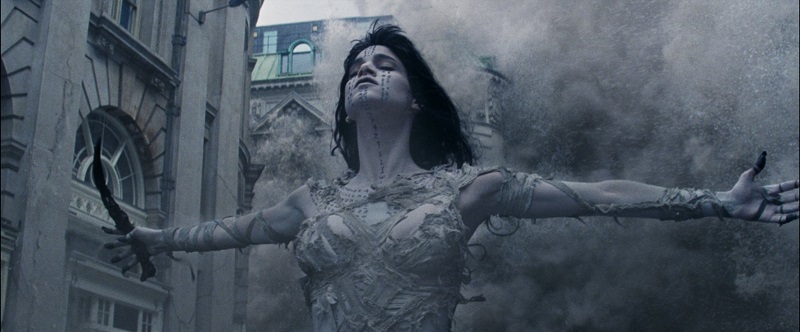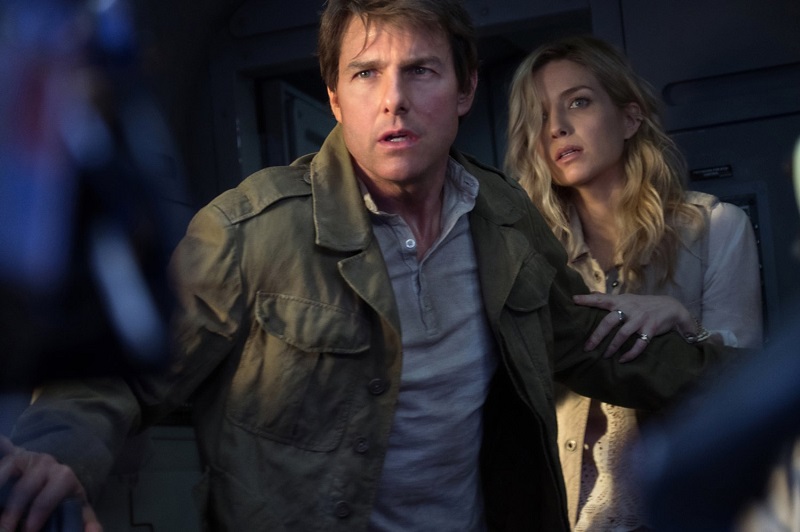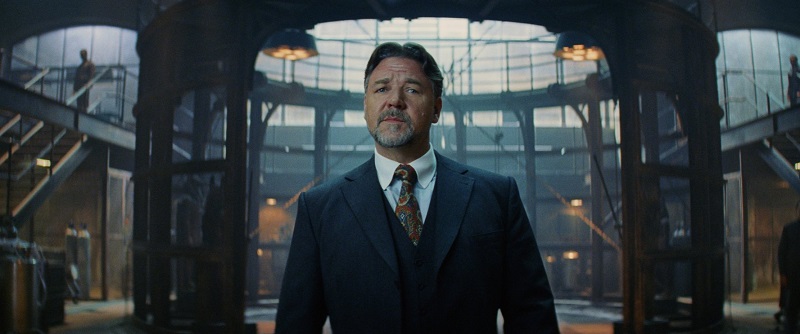Jumping from the dramedy People Like Us to the big budget spectacle of The Mummy is not necessarily a huge leap of faith for Universal Studios to hire director Alex Kurtzman. The helmer has served as a producer on numerous large scale projects in his time, including The Amazing Spider-Man, the first two “new” Star Trek movies and even wrote 2007’s Transformers.
What sold Universal the most was his passion for movie monsters. We caught up with Kurtzman during The Mummy’s recent press day and discovered that it was his adoration for the classic films that starred Boris Karloff and other legends that made him the perfect person to shepherd this new Universal Dark Universe (which will include upcoming films featuring The Invisible Man (Johnny Depp), Frankenstein’s monster (Javier Bardem) and Dr. Jekyll and Mr. Hyde (Russell Crowe, who makes his debut in The Mummy). More is sure to come, including Dracula, but on this day, we’re focused on the Tom Cruise starring reboot of The Mummy.
Kurtzman shares much in the chat, including why he made this Mummy is female, how Crowe’s character could be an anchor throughout the Dark Universe, the joy of discovering new talent like star Sofia Boutella, as well as what else we can expect from the Dark Universe heading forward.
Q: How did it come to be that The Mummy this time out would be female?
Alex Kurtzman: To me, the key of Universal monsters films is that it requires a story that you can connect to. I wanted to honor the tradition of Mummy films, but I also wanted to bring in something new. Many versions of the Mummy was a man. We developed some versions of the script where the Mummy was a man. There were elements that were kind of interesting but nothing that I felt were worth making a movie about. And the voice in my head kept saying make it a woman. When I listened to that voice, the story kind of presented itself in front of me. I love the idea that she’s a strong character who was promised power. She believed that she was going to take the lead of Egypt, who [then] was betrayed by her father — the man she was supposed to trust the most in the world and is now going to take back what she believed she deserves. I love that. A villain is the hero of their own story. It’s true with the monsters. I knew that no matter how dark she went, we would be able to stay true to the spirit of what I believe the monster movies are about.”
Q: What was it about Sofia Boutella that made her your Mummy?
Alex Kurtzman: I saw Kingsman and my jaw was on the floor. What a presence. I knew that I needed an actor who had tremendous physical control over her body because I needed you to believe that a 5,000-year old royal princess came to a modern day. And as we began to work together on movements, it became very clear that the slower she moved, the scarier she was and the more I believed that she was from another time. And what I loved about it was that it harkened back to the Karloff movie in the original mummy which is where I picked the bulk of my influence from. More than that, Sofia has unbelievable eyes that you just connect to and I knew that as long as you can connect to her eyes, you will always connect to the character.”
Q: Will Crowe’s Dr. Jekyll be a connecting thread throughout this Dark Universe?
Alex Kurtzman: Absolutely. When I started developing the script for The Mummy, Henry was not in the story, and neither was Prodigium. In looking for ways to tell a Mummy story in a new way, we came to the idea of, “what if The Mummy was set in a world of gods and monsters, and she is perhaps the first, but certainly not the last.” That was the idea for Prodigium. You begin his own experience and his experience with the mummy [and] he realizes that there is a much larger world out there. There was a lot of debate whether to put Henry in this film. You’ll always look for story reasons to put it. So if I were to describe it for you, Henry’s story is about a man who has good and evil inside of him, who also wants those two things. [He] will have to make a decision about who he is. And now, you’re seeing Tom’s character and experiencing what he’s going through. What’s cool is that now the audience has a little taste for Prodigium and what Henry is doing, we can also open the door. Keep in mind that you have a guy running an organization, who lives in a gray area and is becoming a monster at any time. It makes him somewhat of an unpredictable guy.
Q: Sure, this film is the first chapter of a new monster world for Universal. Do you think that each of the films will have its own feel? The Mummy is so supernatural action. Will Bride of Frankenstein and The Invisible Man fit in that milieu?
Alex Kurtzman: I think the goal is to have a unified tone that allows you to know it is a recognizable Dark Universe movie. That being said, while delivering large-scale entertainment, what I love about the prospect of a Dark Universe is I want every director to come in and put their own stamp on their film. (Director) Bill Condon is obviously doing Bride of Frankenstein and we have an awesome script from David Koepp and in many ways is different from The Mummy and in certain ways similar to The Mummy. That’s the way the universe works best for me. You will see threads that The Mummy has set in motion. There will be a bunch of new stories for Bride, and that’s what’s cool to me about it.
Q: Since the Dark Universe is a shared universe, will we ever see them all in one movie, a la The Avengers or Justice League?
Alex Kurtzman: People forget that the Universal Monsters were the first shared universe. Frankenstein meets Wolfman. They’ve made a bunch of Frankenstein films. They’ve made a bunch of Wolfman films. The audience has time to fall in love with these characters. To me, that’s the key. You’ve got to deliver the audience self-sustaining movies that are individual stories about those monsters. You’ve got to let them know about the monsters and come up with organic reasons to bring them together as we did with Henry Jekyll in The Mummy. If we can get to a point where we’ve used these monsters films and audiences fall in love with each character then we will follow in the tradition of the original Monsters universe. But we’ve got to do it in a way that feels through and thought-through and driven only by story. I tend not to like universes were a bunch of stuff is thrown at me that I haven’t had time to fall in love with the characters. We will get there.
Q: What is it that audiences for nearly a century now have flocked to be terrified by monsters on the big screen?
Alex Kurtzman: I think they’re so enduring. I think that they reflect aspects of us that we all have inside of them. They are always human stories. They are always human character stories. You can pick any monster and look at their backstory and it would be something we can relate to whether it be a love story or a desire to connect to the world. I think we’ve all felt at the core that there are moments in life where we don’t fit in. The beauty of the monsters is you fear them or for them. Every culture in the world has their monster, their own individual monsters and it connects to the Universal monsters. They have endured and been added to the public consciousness — The Bride of Frankenstein, her hair. Frankenstein has the bolts in his neck, the flattop head, and the green skin, Dracula with his fangs and dark cloak. Those are looks that are so iconic and branded into our minds that I think we need to protect them. We need to let them find new light and then start designing the Dark Universe that these monsters inhabit.



